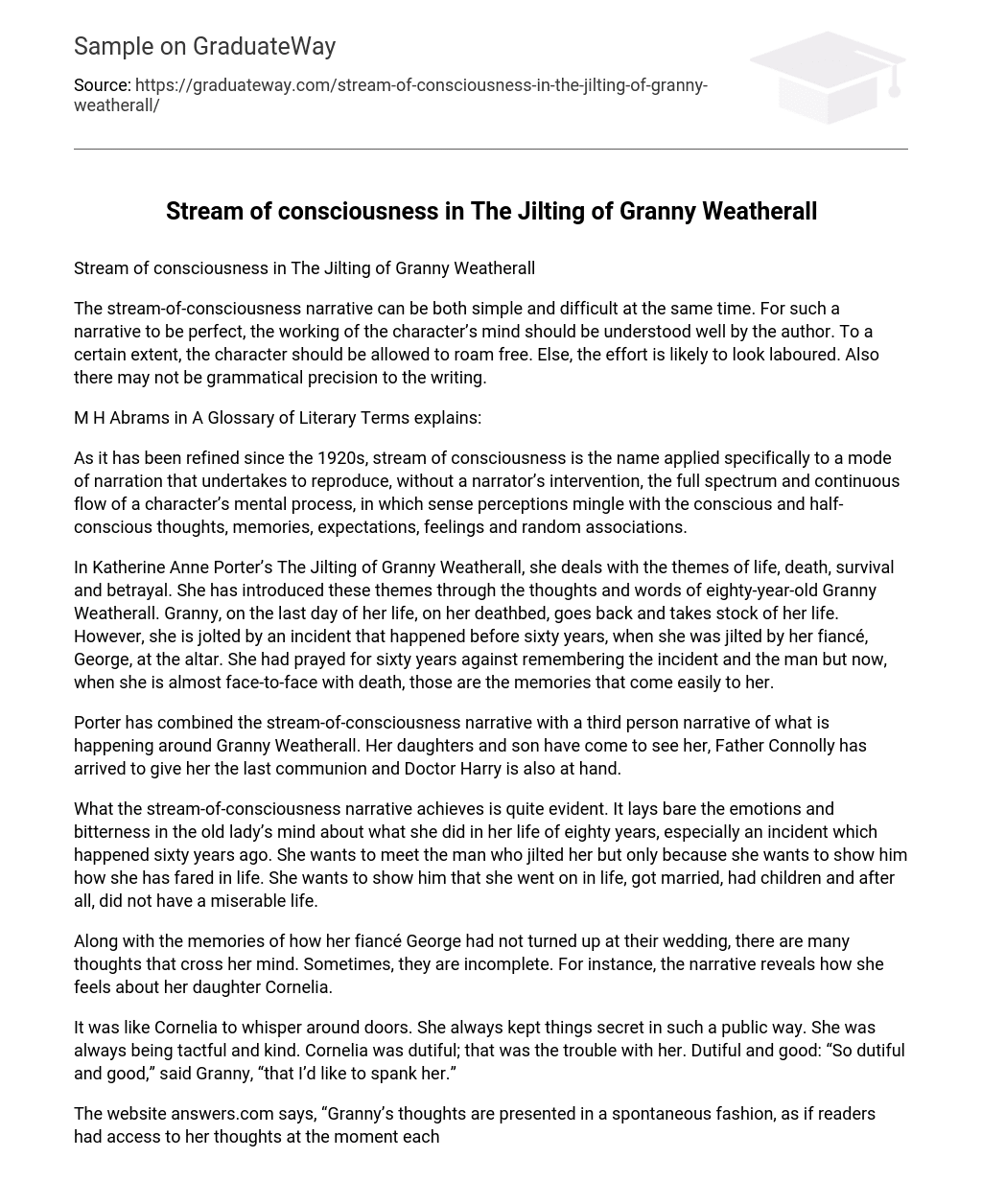The stream-of-consciousness narrative can be both simple and difficult at the same time. For such a narrative to be perfect, the working of the character’s mind should be understood well by the author. To a certain extent, the character should be allowed to roam free. Else, the effort is likely to look laboured. Also there may not be grammatical precision to the writing.
M H Abrams in A Glossary of Literary Terms explains:
As it has been refined since the 1920s, stream of consciousness is the name applied specifically to a mode of narration that undertakes to reproduce, without a narrator’s intervention, the full spectrum and continuous flow of a character’s mental process, in which sense perceptions mingle with the conscious and half-conscious thoughts, memories, expectations, feelings and random associations.
In Katherine Anne Porter’s The Jilting of Granny Weatherall, she deals with the themes of life, death, survival and betrayal. She has introduced these themes through the thoughts and words of eighty-year-old Granny Weatherall. Granny, on the last day of her life, on her deathbed, goes back and takes stock of her life. However, she is jolted by an incident that happened before sixty years, when she was jilted by her fiancé, George, at the altar. She had prayed for sixty years against remembering the incident and the man but now, when she is almost face-to-face with death, those are the memories that come easily to her.
Porter has combined the stream-of-consciousness narrative with a third person narrative of what is happening around Granny Weatherall. Her daughters and son have come to see her, Father Connolly has arrived to give her the last communion and Doctor Harry is also at hand.
What the stream-of-consciousness narrative achieves is quite evident. It lays bare the emotions and bitterness in the old lady’s mind about what she did in her life of eighty years, especially an incident which happened sixty years ago. She wants to meet the man who jilted her but only because she wants to show him how she has fared in life. She wants to show him that she went on in life, got married, had children and after all, did not have a miserable life.
Along with the memories of how her fiancé George had not turned up at their wedding, there are many thoughts that cross her mind. Sometimes, they are incomplete. For instance, the narrative reveals how she feels about her daughter Cornelia.
It was like Cornelia to whisper around doors. She always kept things secret in such a public way. She was always being tactful and kind. Cornelia was dutiful; that was the trouble with her. Dutiful and good: “So dutiful and good,” said Granny, “that I’d like to spank her.”
The website answers.com says, “Granny’s thoughts are presented in a spontaneous fashion, as if readers had access to her thoughts at the moment each one occurs to her.”
She sees death close to her. However, she ignores it at first, almost brushing it aside. She remembers how when she was sixty, she had thought she was nearing her death and had visited her children and written her will. But, she hadn’t died then and had pushed the idea out of her mind. Now, “While she was rummaging around she found death in her mind and it felt clammy and unfamiliar. She had spent so much time preparing for death there was no need for bringing it up again. Let it take care of itself for now.”
The narrative shows how the granny thinks she grew up and strong in her life and hopes she can tell her husband John how she did well. The narrative is interspersed with love and rebuke for her children –how they should do things right and how they shouldn’t waste life.
But, the most touching part of the stream-of consciousness narrative comes when Granny Weatherall sees death as an inevitable nearby truth and asks God for a sign of some afterlife. But, she is jilted here again.
For the second time, there was no sign. Again no bridegroom and the priest in the house. She could not remember any other sorrow because this grief wiped them all away.
Works cited
Abrams, M. H. A Glossary of Literary Terms. New Delhi: Harcourt India Private Limited. 2001.
Porter, Katherine Anne. “The Jilting of Granny Weatherall.” Flowering Judas. Ed. Virginia S Carr. Pennsylvania: Rutgers University Press, 1993.
http://www.answers.com/topic/the-jilting-of-granny-weatherall-story-5





